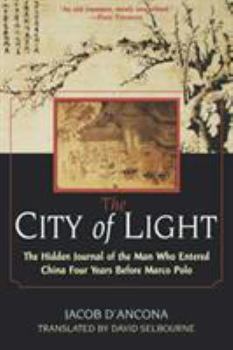The City Of Light
Select Format
Select Condition 
Book Overview
In 1270 a scholarly Jewish merchant called Jacob d'Ancona set out on a voyage from Italy. A year later, he arrived in China at the coastal metropolis of Zaitun, the "City of Light" (now known as Quanzhou), four years before Marco Polo arrived at Xanadu in 1275. Nothing was known of this epochal journey until 1990, when David Selbourne was shown d'Ancona's account of his travels, a remarkable manuscript that had been hidden from public view for more...
Format:Paperback
Language:English
ISBN:0806524634
ISBN13:9780806524634
Release Date:March 2003
Publisher:Kensington Publishing Corporation
Length:528 Pages
Weight:1.50 lbs.
Dimensions:1.4" x 5.7" x 9.3"
Customer Reviews
4 ratings
Ian Myles Slater on: A Remarkable Book, as Memoir or Fiction
Published by Thriftbooks.com User , 21 years ago
I am glad to see that the (delayed) American edition of this book is now in paperback. It differs from the UK edition (which I have also reviewed) mainly by including "Remarks on The City of Light " by Wang Lianmao, in which modern Chinese scholarship is used to reply to some of the criticism directed against it by Westerners. Specialists in the history of the region find some puzzles, and probable errors made by a foreigner, but nothing to suggest a modern fraud. They seem willing to accept it as an authentic account of southern China by a foreigner, describing events shortly before the arrival of Marco Polo in the following of the Mongol (Yuan) conqueror. (Probably wisely, they do not seem to have offered an opinion on how authentic the foreigner -- an Italian Jew -- looks to them.) Curiously, Frances Wood, whose "Did Marco Polo Go to China?" argues that the Venetian merchant stayed in western Asia, and got all his information from others, who left no record of their adventures, seems to have joined in denouncing Jacob of Ancona as a fabrication, even though this must have seemed like manna from heaven for her theory. (By the way, it seems clear to me that, despite various major and minor interpolations and deletions in the manuscript tradition, Marco Polo did travel in East Asia -- so maybe I'm gullible.) I would add, from my own cursory research, that I have some problems with the supposedly convincing argument that the use of the term "mellah" for "Jewish Quarter" in Muslim lands is anachronistic. This argument depends on accepting one version of the etymology and history of the word. It is, however, less than completely certain; Roger Le Tourneau, in "Fez in the Age of the Marinides" (English translation 1961), reviewed the complicated evidence, and suggested that the consensus, including how long the word was in use and when and where it was adopted, might be wrong. From a Jewish perspective, I can accept Jacob of Ancona as a plausible figure (and perhaps more typical than Selbourne, to judge from his notes, realizes). The combination of length and literary quality in a memoir seems unusual for the period, but the translator reports omitting some sections at the end, and felicitous translation can add charm without being unfaithful. Some medieval writings *are* inordinately long -- and long-winded. Jaob's report of debates with Chinese officials leaves me wondering if both his contacts and his discussions were really on such a high level (especially with both sides using some sort of "trade speech" and translators), but self-congratulatory memoirs are not a modern invention. On the basis of Chinese reactions, I am prepared to accept the work as authentic, although not completely reliable as a record of fact (is anything?). If it is a fraud -- and only an examination of the manuscript seems likely to prove it -- its creator would surely have been better rewarded by emulating Eco's "Name of the Rose," and publishing it as hist
Excellent.
Published by Thriftbooks.com User , 22 years ago
OK, nobody else has seen the original, so there's no way of verifying if this is a true translation or a hoax. If it is a hoax, it's a danmed good one, written so well, with lots of research to back it up, that I for one don't care.This is just brilliant, true or hoax, it gives a deep insight into the Jewish support network and all the opposition & prejudice that Jews had to deal with. It knocks Marco Polo's account into a cocked hat; incisive philosophy, intimate desriptions of mediaeval life and trade are enough to grant this a place on anyone's bookshelf, true or not.
Brilliant. ...One way or another.
Published by Thriftbooks.com User , 23 years ago
This is simply one of the best books I have ever read. And it is definitely, hands down, with a doubt, the single funniest book I have ever read... though it isn't actually intended to be. Until the actual Ancona manuscript itself is made available for scrutiny, we will never know for sure if this text is authentic or a stunningly brilliant, almost cruelly sharp-witted satirical hoax. If it is the latter, it is still extremely impressive, informative and entertaining. Nearly every sentence is punctuated by the author Jacob's constant use of "May God be praised" or "May God spare me", or, for those individuals and groups he really despises: "May God strike them down" or "May God shorten their lives". I just could not stop laughing! - nor could I put the book down. Mr. Selbourne, wherever you are, I want to thank you from the bottom of my heart, sir. One way or another you have given us an amazing piece of work. May God magnify and bless you, and may He extend your life! Amen, Amen, Amen!
Wonderful!
Published by Thriftbooks.com User , 23 years ago
I thought this book was a wonderful look at history in not such a boring way. I had to read this book to write a book critique on for a World Cultures class and it was a wonderful read!






